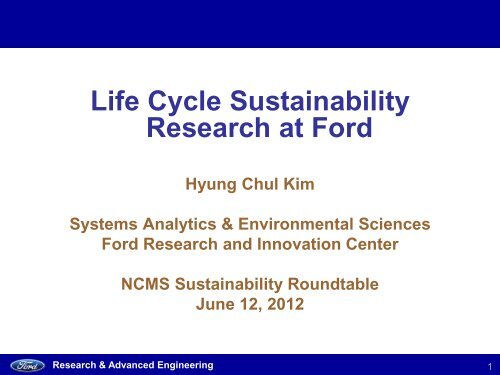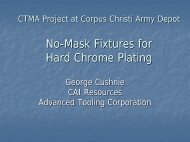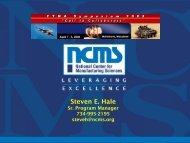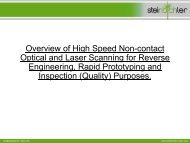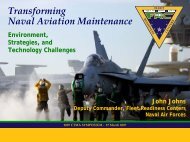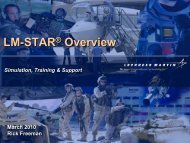Dr. Hyung Chul Kim - National Center for Manufacturing Sciences
Dr. Hyung Chul Kim - National Center for Manufacturing Sciences
Dr. Hyung Chul Kim - National Center for Manufacturing Sciences
Create successful ePaper yourself
Turn your PDF publications into a flip-book with our unique Google optimized e-Paper software.
Life Cycle Sustainability<br />
Research at Ford<br />
<strong>Hyung</strong> <strong>Chul</strong> <strong>Kim</strong><br />
Systems Analytics & Environmental <strong>Sciences</strong><br />
Ford Research and Innovation <strong>Center</strong><br />
NCMS Sustainability Roundtable<br />
June 12, 2012<br />
Research & Advanced Engineering 1
Design <strong>for</strong> Lifecycle Sustainability<br />
Ford uses a lifecycle approach to assess<br />
and minimize the total impacts of vehicles<br />
from a sustainability perspective.<br />
- Product Sustainability Index (PSI)<br />
- Life Cycle Water Footprint<br />
- Study on Biofuel Indirect Land Use Change<br />
- Recycled and Renewable Materials<br />
- Other<br />
Research & Advanced Engineering<br />
2
Design <strong>for</strong> Life Cycle Sustainability<br />
Materials<br />
Acquisition/<br />
Processing<br />
Material<br />
Sustainability<br />
(Rare earth; Li)<br />
Supply Chain<br />
Management<br />
Research & Advanced Engineering<br />
Product Sustainability Index (PSI)<br />
Water Footprint<br />
<strong>Manufacturing</strong><br />
and Assembly<br />
Tank-to-<br />
Wheel<br />
Well-to-<br />
Tank<br />
Biofuel Indirect<br />
land use<br />
CO2 Glide path<br />
End-of-Life<br />
/Recycling<br />
Use of<br />
recycled<br />
materials<br />
3
Cost<br />
of Ownership<br />
Mobility Capability<br />
PSI Example - Galaxy<br />
Safety<br />
Key: inside worse<br />
outside better<br />
Prior Ford Galaxy 1.9l TDI<br />
New Ford Galaxy 2.0 l TDCi with DPF<br />
80% theoretical best cross-industry<br />
B to V segment Europe<br />
Research & Advanced Engineering<br />
Global<br />
Warming<br />
<strong>Dr</strong>ive-by-exterior Noise<br />
*<br />
20 40 60 80 100<br />
Air Quality<br />
Sustainable Materials<br />
Restricted Substances<br />
Source: Ford Sustainability Report 2010/2011<br />
*
Life Cycle Water Footprint<br />
Life Cycle Phase Water use Consumption<br />
Material production 169,212 5,570<br />
Parts production 34,956 894<br />
OEM assembly/production 2,300-6,800 670-2,310<br />
Use (11.7 km/liter fuel<br />
economy)<br />
Research & Advanced Engineering<br />
153,734 to<br />
8,950,288<br />
51,965<br />
Recycling 3,039 259<br />
Total [liters] At least 363,000 Around 60,000<br />
5
Recent Publications on Sustainability<br />
Biofuel Indirect Land Use<br />
Rare Earth Material Availability<br />
Lithium Availability<br />
Research & Advanced Engineering<br />
6
Research & Advanced Engineering<br />
Conclusions<br />
1. Ford is using LCA methods to assess and find<br />
opportunities to reduce the impacts of our products over<br />
their entire life cycle.<br />
2. LCAs are used to measure sustainability indicators such<br />
as Greenhouse Gas, Water Footprint, Land Use Change,<br />
and Material Availability.<br />
3. Sound scientific understanding is required in conjunction<br />
with LCA. Sustainability issues are complex and require<br />
thoughtful consideration.<br />
4. Need <strong>for</strong> long-term perspective, sustainability is by<br />
definition a long-term challenge.<br />
7


